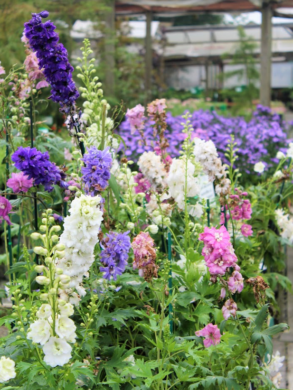14 Plants You Need to Keep Your Garden Happy and You Healthy

There are so many reasons to be completely amazed by Nature. I won’t sit here and write them all out (although that would be fun, and I might elsewhere), but one of the best things about Nature is that—through the beauty of companion planting—she provides us with natural insect repellent!
That’s right! She has plants that naturally and effectively repel a wide range of insects/pests that are troublesome both to us and to our crops. Know what that means? We can ditch the bug sprays and the chemical pesticides! Sweet victory!
You can easily get started with companion planting using the following 14 plants. They can provide you with relief and comfort knowing that Nature is protecting you and your plants from those harmful insects.
- Marigolds–These beauties repel squash bugs, aphids, tomato worms and mosquitoes. They even repel mice and rabbits! This plant can also be used for its medicinal qualities–aka Calendula–and is beneficial to have on hand if a little pest bites you.
- Lavender–Not only does lavender smell amazing in your garden, but it deters mice, beetles, mosquitoes, flies, moths, caterpillars, moths, and fleas! Definitely an all-in-one plant to have around.
- Oregano–You can grow this herb all along your vegetable garden and the smell will confuse the pests trying to make their way to your veg. Also, if you don’t want to have to deal with grass in a garden, oregano makes for excellent, edible ground cover.
- Catnip–Thanks to the essential oil nepetalactone found in Catnip, it’s crazy effective at repelling mosquitoes (in fact, it’s 10x more effective than DEET!)
- Garlic–The idea behind garlic is that the smell is so strong it confuses the bugs, throwing them off their plant-eating warpath. It’s toxic to the mealworm/mealworm beetle and blowfly larvae and repels ticks. And when you grow your own garlic, you’ll also get the delicious bulbs to use in your kitchen–win win!
- Chrysanthemums–Not only will you have beautiful flowers in your garden, but with chrysanthemums you’ll be able to fend off mosquitoes and other creepers like human lice, cockroaches, beetles, and flies.
- Citronella Grass (or Lemongrass)—Both citronella and lemongrass are from the same family and both are effective at deterring mosquitoes away from your body and world. So, if you want to sit in your garden at dusk, plant some of these bad boys and enjoy that glass of wine (or tea from your lemongrass) in peace.
- Basil–This is one of my favorite herbs, particularly when paired with mozzarella and tomato. It’s also great for companion planting purposes, and it deters my least favorite insects–-mosquitoes–-as well as gnats and the obnoxious house fly.
- Tomatoes–Who would have thought that these big beautiful fruits could repel insects? Turns out, they have a chemical called alkaloid in them that does just that. Fun (or maybe not so fun?) Fact: Tomatoes are part of the nightshade family and may cause gastrointestinal issues if you eat too much or one that is too fresh. Crazy, right?
- Mint–Want to make mojitos? Check. Want to make toothpaste? Check. Want to repel a variety of pests in one fell swoop? Check. Mint is where it’s at. (Although you might want to grow this one in a pot and put it around your garden or where you like to hang out–it’s super invasive if you plant it in the ground.)
- Fennel–Though not a common choice that’s put in a garden (to my knowledge), this member of the carrot and parsley family will keep you safe from mosquitoes and is also said to repel our slimier friends, slugs and snails.
- Petunias–These little beauts also have alkaloids and protect your tomatoes, asparagus, and squash, for starters. Another reason to love petunias? They’re the namesake of one Kristin’s favorite chickens–she’s a beautiful Barred Rock that loves to sitting on shoulders and snuggling.
- Thyme–This versatile herb is effective at repelling mosquitoes and killing spider mites. It’s also just a delightfully happy looking plant that will bring joy to your taste buds.
- Rosemary–Rosemary tastes delicious with pork and is toxic to moths and cabbage loopers. So bring those summer lanterns to your garden without worrying about getting dive-bombed by these winged fiends.
It’s amazing what Nature already provides us with if we open our creative minds (and gardens) to learn about what she has to offer! Even if you don’t have enough space to get started with companion planting right away, it’s okay! Make a tea bag/satchel of the herb you can leave next to the plant it pairs with, or make your own herbal spray to put on those plants once or twice a week.
Want to dig a little deeper into companion planting? Permaculture gardening is an even-more-specific way of utilizing the space and plants you have to be one beautiful, well-oiled machine of biodiversity with little maintenance on your part! If you want to learn more about how to grow a garden that is even more self-sufficient and takes care of itself, check out this book on permaculture. There you have it! A natural solution to contemporary problems!
Click here for more resources and information about this topic.
You can click the button below to go back to the Gardening articles, or you can venture over to our DIY Gardening recipes and the Gardening supplies and products we love!
Disclaimer: All information contained herein is intended for educational purposes only. It is not provided to diagnose, prevent, or treat any disease, illness, or injured condition for any human or animal, and Mother Nature’s Truths, as well as the author(s), contributor(s), publishers, and owners accept no responsibility for such use. Anyone suffering from any disease, illness, or injury, or who has an animal suffering from such, should consult with their physician or veterinarian. The statements herein have not been evaluated by the Food and Drug Administration.